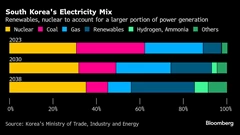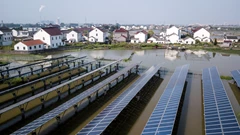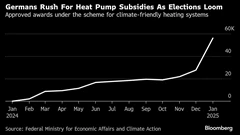Flux Sells Africa’s First Crushed Rock Carbon Dioxide Removals
(Bloomberg) -- Flux, a Nairobi-based climate startup, has sold Africa’s first carbon dioxide removal credits based on the practice of using crushed basalt to absorb the climate-warming gas.
The company, formed about a year ago, has pre-sold credits based on the future removal of 540 tons of carbon dioxide from the atmosphere using the technique known as enhanced rock weathering. The trade, made to test the market appetite for the removals, took place today on Kenya’s CYNK platform with the Milkywire Climate Transformation Fund acquiring them for $370 each, the exchange said.
The enhanced weathering technique involves the grinding up of certain types of rocks like basalt and spreading them across large areas. Those rock fragments react with rainwater to speed up a natural process of absorbing CO2, which is eventually washed into oceans where it can be stored for centuries or longer. It also increases soil fertility.
Flux is basing the project on spreading basalt on a 600 hectare (1,490 acre) sugar cane plantation in Kenya. It has signed memorandums of understanding to carry out the practice in Nigeria in a program with the government and to work with an agribusiness in Cameroon to spread the basalt across 205,000 hectares of land planted with corn.
“This has huge potential across the continent and Flux is the first company to do it,” said Sam Davies, co-founder and chief executive officer of the company. “We know we are going to need a lot of carbon removal in the future. We are going to need permanent carbon removals, we need them at scale.”
While the technique could remove as much as 2 billion metric tons of CO2 annually, according to research published in in 2020, large scale trials are underway to verify how effective it can be.
Sign up here
©2024 Bloomberg L.P.
KEEPING THE ENERGY INDUSTRY CONNECTED
Subscribe to our newsletter and get the best of Energy Connects directly to your inbox each week.
By subscribing, you agree to the processing of your personal data by dmg events as described in the Privacy Policy.
More renewables news

GB Energy Faces Doubts as UK Declines to Affirm Future Funds

Korea Cancels Planned Reactor After Impeaching Pro-Nuke Leader

Brazil’s Net-Zero Transition Will Cost $6 Trillion by 2050, BNEF Says

SolarEdge Climbs 40% as Revenue Beat Prompts Short Covering

EU to Set Aside Funds to Protect Undersea Cables from Sabotage

China Revamps Power Market Rules In Challenge to Renewables Boom

KKR increases stake in Enilive with additional €587.5 million investment

TotalEnergies and Air Liquide partner to develop green hydrogen projects in the Netherlands

Germany Set to Scale Down Climate Ambitions
















